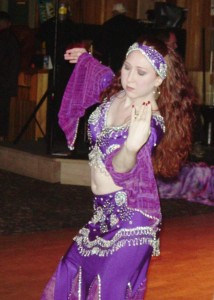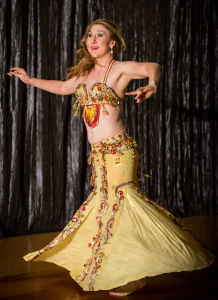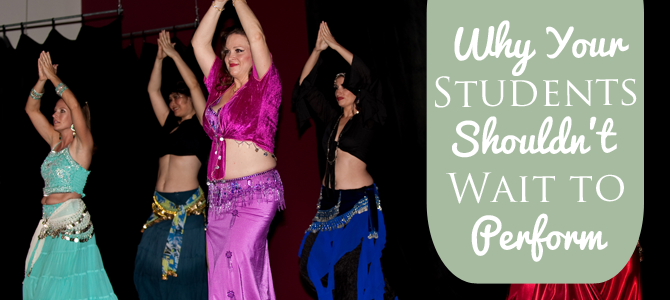As a dance teacher, one of the roles we play is “therapist”. Perhaps more important at times than providing our student’s dance instruction, we provide informal counseling when it comes to dealing with the psychological issues that arise when our dancers are faced with performing. Many dancers lack self-confidence and/or self-esteem and ironically that may be the very reason they begin belly dancing in the first place – to help them build confidence. Sometimes they have doubts about their abilities and fear the judgment and ridicule of others. And, of course, there are those that are paralyzed by perfectionism, believing their skill is never enough, so they never reach “good enough” to perform at certain levels or in certain perceived circumstances. All of these issues may lead to mild anxiety at the thought of performing, some resulting in varying degrees of stage fright or behaviors that undermine and prevent the dancer from doing what they really wish to do – perform confidently.
EXCUSES, WOE, WOE, WOE, EXCUSES

Couldn’t even open my eyes. I was so scared!
When these dancers are faced with performing, and it may be their first performance or certain types of performances that are unfamiliar territory (first solo, first improvisation, large stage, restaurant environment, any variable really), the dancer will come up with reasons to justify them not performing or rather why they should wait, despite their teacher feeling they are ready.
Truth is, the dancer’s mind (ego) must make these excuses to itself or the dancer will have to address the real reason(s) behind the doubt and fear. However, as long as the dancer stays in class and keeps moving forward toward and through various performances, the dancer will eventually deal with or lessen the impact of the real issue(s) or surpress their feelings while still functioning. We, as teachers, can’t ever expect that our dancers will ever let loose of all their baggage while under our tutelage, but we can help them begin that journey and support them along the way. Even the act listening to them and becoming a safe-haven for their negative feelings, with encouragement, may bring about positive feelings of well-being and healing for your students as they gain more confidence, reduce anxiety, and find freedom while dancing.

Still can’t smile…or look forward!
Alas, we’re not psychologist and we can only do so much. Sometimes counseling helps and sometimes it leaves dancers more room to come up with more justification for not moving to the next performance challenge or even worse, enables them to wallow and continue to delude themselves in their own excuses. Neither of these are acceptable.
Dancers have many excuses, the most common are, “my skill isn’t good enough” or “what will people say or think about me?” These are based in self doubt and fear of judgment, at least they are clear indicators of a problem. However, you may also experience dancers with more subtle avoidance behaviors like the dancer who never finishes a choreography due to perfectionism (perfectionism is a more clever disguise for fearing other’s judgment) or the dancer that avoids the situation entirely, by claiming they are only taking classes to exercise or always conveniently unavailable during dance shows.Instead of trying to work through the negative feelings and unreasonable excuses for not performing, I would suggest a different approach, explaining to students why it really is in their best interest to perform and how waiting will actually retard their growth, and may even produce a worse situation and increase the likelihood of some of their fears coming true if they wait any longer.

Still scared, but at least my eyes are open and I am almost smiling!
TECHNICAL AND PERFORMANCE SKILLS SHOULD GROW TOGETHER
In an ideal situation, the dancer without inhibition will learn the basics, learn a choreography or two, and begin performing choreography. The dancer will keep growing technically, perfecting and gaining greater physical skills, and their performance skills will improve as they do these two things in tandem. The most well-rounded belly dancer will result – technically strong and great stage presence.
When a dancer chooses to stop working on either of these skills their overall dance ability will suffer. Some dancers feel that they must first amass great skill, BEFORE they can perform. I don’t believe this to be true. Dancers definitely should have a good handle on the basics and that is enough to begin teacher-guided performance under controlled conditions like student shows that provide a safe space for growth. Why this needs to be done early in a belly dancers journey is because unlike many other dance forms, belly dance heavily values the dancer’s individual expression of personality and the ability to interact with the audience. This is because most belly dancer performances take place on a much smaller stage and much closer to its audience, than other forms of dance like ballet, which usually occurs on a larger stage. In ballet, the entertainment is seen and felt from a distance, but in belly dance the entertainment experience is much closer and more directly interactive. So, the approach must be different than the approach of other dance forms to more quickly bring out the dancer’s personality and comfort with the audience.

Then you get comfortable on stage.
Any dancer would agree how detrimental to their overall skill it would be to perform and never work on one’s technique or gather knowledge about the many facets of our dance form, but dancers will hold firm to their belief or EXCUSE that performing isn’t as critical to their overall development or that it should wait until they feel better about it. But that “feeling better about it” comes way too slowly for man and it eats up their precious dance opportunities and time. Time they can never get back.
And sadly, I see other teachers supporting the “wait” perspective for various reasons. They may fear putting out “substandard” dancers to guard their reputation. They may only wish to showcase pro troupe dancers of the highest quality and experience. And I really can’t judge them for their reasons, however, I would suggest to them that it would be more beneficial for them and their students if they provided more amateur opportunities, for student retention and growth alone, it’s worth it.
GET THEM PERFORMING SOONER, RATHER THAN LATER
I would prescribe, even in beginner classes, that the dancer begin to practice performance skills, like relaxation during practice, being aware of the potential audience through their attention and body position, smiling, and introducing the dancer to the roles of the performer and audience, etc, etc.

Deeper skills are honed.
Stage training should begin early in the dancer’s education. The dancer can’t meander in the classroom too long, they must as soon as they are ready, apply these skills in a live setting. This is a performance art after all. And truth is… you can’t really practice performing under other conditions (classroom) than actual live performance and expect to get the same level of experience. Pretending to perform is one thing, and it does help and have its place, but there are more variables that are not found while you are merely practicing. These skills can only be developed through real performance experience.
THE STAGE IS THEIR CLASSROOM
There is no level of pre-performance development that will help you to attain these skills outside of actually just doing it. It would be the same as an apprentice not taking on the easy jobs because they are afraid of not having the skills, but they can’t get the skill unless they just do the work.
THE DANGERS OF WAITING
I would go as far as saying, if a dancer waits, they are actually retarding their growth. Because, while their technical skill may improve, their performance skill will suffer. Eventually when this dancer musters enough courage to get on stage, the dancer will actually be at a disadvantage, because now their skill is imbalanced. This state of being imbalanced isn’t where a dancer wants to be. It’s actually much more awkward and cringe-worthy, then being a new, inexperienced dancer.
From an audience perspective, its expected that newer performers lack refined skills, but when a dancer has imbalanced skills, the audience isn’t as forgiving, they may feel the dancer is newer than they really are and will see them as unpolished. Logically, doesn’t it make more sense for new dancers to go through the process organically. Isn’t it better to be new and have the audience know you are new and their expectation be lower? Contrast that to a dancer that has been dancing a while, has amassed technical skills, yet looks mortified, can’t relax, looks stiff, hasn’t worked out their nervous habits, or can’t connect with the audience because they have neglected a whole, very important segment of their learning experience. The dancer hasn’t realized and accepted the stage as their classroom.
THE STAGE ISN’T THE RESULT NOR THE END

Lastly, complete freedom on stage is attained!
So what can you do? Help your students change their perspective by sharing the importance of the performance element in their development. Tell them, the stage itself isn’t the RESULT nor the END. That way of thinking is a fallacy. The stage is our very training ground! While performing well with skill and ease could be considered a level of attainment on the stage, you can’t take shortcuts, you must start at the beginning and work through every step. Each dancer must start as an inexperienced stage performer. No way around it and the sooner they get out there, the sooner they will attain the level they desire.
Once dancers have walked the path long enough they will eventually realize their reasons are completely irrational and are lies of the ego to protect itself from what? UNFAMILIAR TERRITORY! When the dancer moves past this, then they see the silliness of their excuses and often wish they would have come to their senses much earlier, regretting their choice to wait in retrospect. Unfortunately, they can’t turn back time and do a redo, so we must continue to counsel our dancers on why they shouldn’t wait to get our there and GROW.

